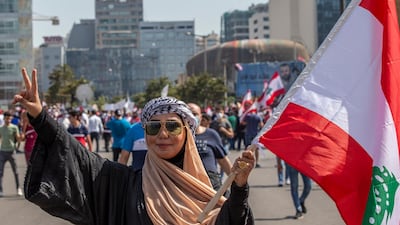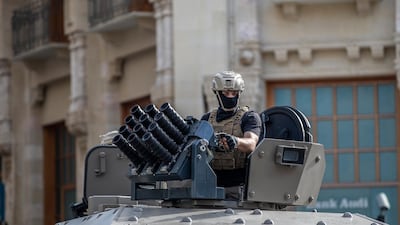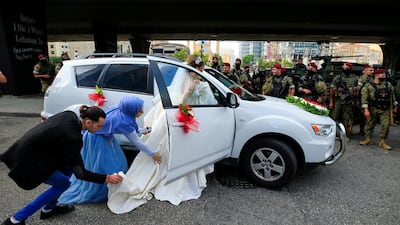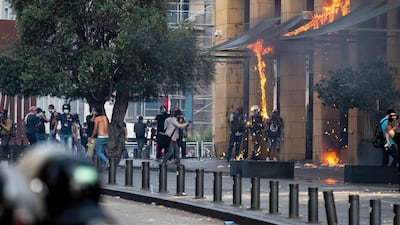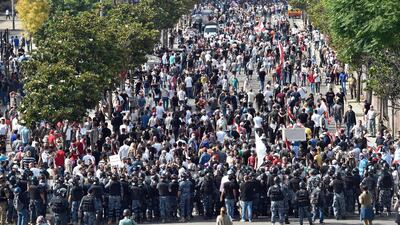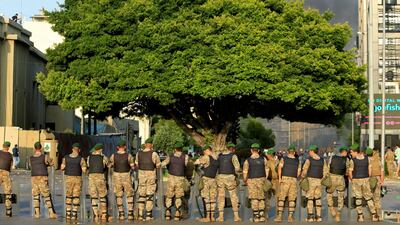Lebanon’s president urged calm and religious authorities rushed to defuse tension after mass protests took a sectarian turn on Saturday night and the military said no further breach would be tolerated.
President Michel Aoun called on the nation to heed Saturday’s clashes as a “warning bell”.
“The persecution of any religious symbol or Lebanese sect is the persecution of all Lebanese,” Mr Aoun said. “Our strength was, is and will remain in our national unity, whatever our political differences.”
Both Dar Al Fatwa, the country’s highest Sunni authority, and Imam Abdul Amir Qabalan, Lebanon’s highest Shiite authority, condemned sectarian chants and slogans heard during Saturday night’s demonstrations.
Thousands took to the streets in downtown Beirut on Saturday afternoon in a return of the anti-government demonstrations that brought down the government of Saad Hariri in October.
But as the day wore on, protesters – throwing stones and fireworks – fought with the police who fired tear gas. At least 48 people were wounded, the Lebanese Red Cross said.
Officers also moved to break up scuffles between a contingent of Hezbollah and Amal Movement supporters and the protesters.
Demonstrators chanted anti-Hezbollah slogans and insults about its leader, Hassan Nasrallah, while the supporters chanted sectarian slogans back.
In chants heard in videos posted online the group can be heard insulting revered Sunni figures including Aisha, one of the Prophet Mohammed’s wives.
In response, groups took to the streets and blocked roads in several largely Sunni areas of the country – including south Beirut – and gunfire was reported.
The Lebanese army warned that it would not tolerate future incidents, saying the “security of the people and country is above any other consideration.”
The military warned that Saturday’s sectarian-charged clashes could have “dragged the country into a dangerous slope, as what happened almost destroyed national unity, tore civil peace and nurtured division."
Dar Al Fatwa, Lebanon’s highest Sunni religious authority, called for calm and said Muslims should not fall “into the trap of sectarian and religious sedition”.
It said: “The insults emanate from certain ignorant people who do not know the true values of Islam”.
The Shiite High Council supported the statement of Dar Al Fatwa and said there were “suspicious attempts to evoke sectarian sedition among the Lebanese and to strike at their national and religious unity”.
Lebanon’s most senior Shiite politician, Parliament Speaker Nabih Berri, also condemned the chants as “worse than murder,” and an attempt to “assassinate the country."
"Every act from any side targeting Lebanese unity, security, stability and livelihoods is an Israeli act. Any voice that promotes strife [between the Lebanese] is a Hebrew voice, even if spoken in Arabic," he said in a statement released by Parliament’s press office.
Former prime minister Saad Hariri said he was appalled by the insults and called on people not to react in a way that would threaten civil peace or sow discord.
“Any insult against Sayyeda Aisha is disgraceful and unacceptable and struck us all at the core,” he said in a tweet. “I appeal to … all religions to respect the statement of Dar Al Fatwa and warn the Muslim public against falling into the trap of sectarian strife. God’s curse on strife and those who awaken it.”
Hezbollah also denounced the chants, saying it did not support the message. It also spoke out against sectarian division. Amal officials denounced what it called a “blatant attempt to provoke sedition between the faithful”.
The military was present in large numbers in Ein El Remmeneh and Chiyah in south Beirut, a mixed Christian-Shiite site of one of the massacres of the 1975-90 civil war.
Prime Minister Hassan Diab’s office tweeted, saying: “The prime minister condemns and denounces in the strongest terms, all sectarian slogans ... and calls on all Lebanese and their political and spiritual leaders to exercise awareness and wisdom and co-operate with the army and security services.”

